情态动词(完整整理版)
情态动词归类大全

情态动词一:情态动词的用法:常用的情态动词有can,may,must,need,should, had better.1. can 的用法:①表示能力“能,会” eg: He can speak a little Japanese.他会说一点日语。
②表示请求或许可“可以” eg: Can I help you? 要我帮忙吗?③表示猜测“可能” eg: Where can she go now? 她可能到哪里去了呢?2.may 的用法:①表示请求或允许“可以”“准许” eg: May I go home,please?请问我可以回家吗?②表示可能性“可能”、也许” eg: I think it may rain this afternoon. 我想今天下午可能下雨。
注:might为may的过去式,但也可以代替may,语气较为婉转客气或更加不肯定。
eg: ① He might not come today.今天他也许不来了。
(语气不肯定)②You might also get a headache when you work too hard,当你工作太努力时,你也可能患头痛3. must的用法:①表示义务、必要或命令“必须、应该” eg: You must come early tomorrow.你明天得早来。
②表示推测时“肯定,一定” eg: They must be at home.The light is on 他们肯定在家,灯亮着呢.③ must not 禁止,不许 eg: You must not tell lies. 你不许撒谎。
注意:①must开头的疑问句,其否定回答通常用 don't have to 或needn't 。
而不用mustn'teg: ---Must I finish my homework first? 我必须先完成作业吗?---No, you don't have to/ needn't. 不,你不必。
超级全的情态动词所有整理
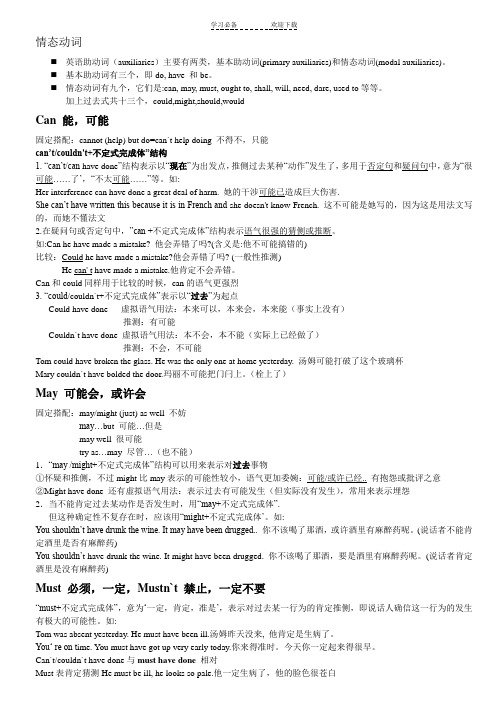
情态动词⏹英语助动词(auxiliaries)主要有两类,基本助动词(primary auxiliaries)和情态动词(modal auxiliaries)。
⏹基本助动词有三个,即do, have 和be。
⏹情态动词有九个,它们是:can, may, must, ought to, shall, will, need, dare, used to等等。
加上过去式共十三个,could,might,should,wouldCan 能,可能固定搭配:cannot (help) but do=can`t help doing 不得不,只能can’t/couldn't+不定式完成体”结构1. “can’t/can have done”结构表示以“现在”为出发点,推侧过去某种“动作”发生了,多用于否定句和疑问句中,意为“很可能……了’,“不太可能……”等。
如:Her interference can have done a great deal of harm. 她的干涉可能已造成巨大伤害.She can’t have written this because it is in French and she doesn't know French. 这不可能是她写的,因为这是用法文写的,而她不懂法文2.在疑问句或否定句中,”can +不定式完成体”结构表示语气很强的猜侧或推断。
如:Can he have made a mistake? 他会弄错了吗?(含义是:他不可能搞错的)比较:Could he have made a mistake?他会弄错了吗? (一般性推测)He can' t have made a mistake.他肯定不会弄错。
Can和could同样用于比较的时候,can的语气更强烈3. “could/couldn`t+不定式完成体”表示以“过去”为起点Could have done 虚拟语气用法:本来可以,本来会,本来能(事实上没有)推测:有可能Couldn`t have done 虚拟语气用法:本不会,本不能(实际上已经做了)推测:不会,不可能Tom could have broken the glass. He was the only one at home yesterday. 汤姆可能打破了这个玻璃杯Mary couldn`t have bolded the door.玛丽不可能把门闩上。
(完整版)七年级情态动词
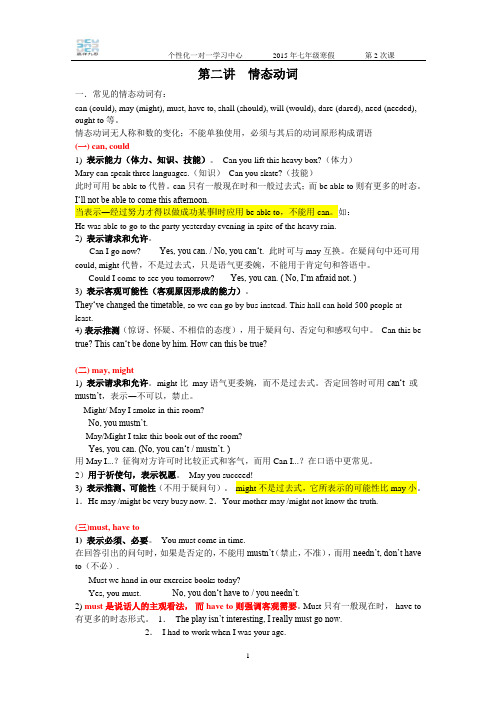
第二讲情态动词一.常见的情态动词有:can (could), may (might), must, have to, shall (should), will (would), dare (dared), need (needed), ought to等。
情态动词无人称和数的变化;不能单独使用,必须与其后的动词原形构成谓语(一) can, could1) 表示能力(体力、知识、技能)。
Can you lift this heavy box?(体力)Mary can speak three languages.(知识)Can you skate?(技能)此时可用be able to代替。
can只有一般现在时和一般过去式;而be able to则有更多的时态。
I‘ll not be able to come this afternoon.当表示―经过努力才得以做成功某事‖时应用be able to,不能用can。
如:He was able to go to the party yesterday evening in spite of the heavy rain.2) 表示请求和允许。
-----Can I go now? ----- Yes, you can. / No, you can‘t. 此时可与may互换。
在疑问句中还可用could, might代替,不是过去式,只是语气更委婉,不能用于肯定句和答语中。
---- Could I come to see you tomorrow? ---- Yes, you can. ( No, I‘m afraid not. )3) 表示客观可能性(客观原因形成的能力)。
They‘ve changed the timetable, so we can go by bus instead. This hall can hold 500 people at least.4)表示推测(惊讶、怀疑、不相信的态度),用于疑问句、否定句和感叹句中。
情态动词(完整整理版)

情态动词1. 情态动词的推测表达2. 情态动词表达虚拟语气3. 某些情态动词的特殊用法一、知识重点与难点总结知识重点:情态动词在表达推测意义的句子中的运用:(一)用情态动词表达事实的推测。
can ,could ,might ,may,must 可以用来表达对事实的推测。
根据说话人对事实的把握性大小,must 表示“肯定⋯,”may / might / can / could 表示“可能⋯⋯,”must 只用于肯定句中,may / might 的否定式may not / might not 表示“可能不⋯⋯”, 而can / could 可以用于疑问句,表示“可能,可能⋯⋯吗?”,其否定式can't / couldn '表t示“不可能。
”用情态动词可以对现在或过去的事实进行推测。
对不同的时间内容推测有不同的结构。
(二)对现在的事实进行推测:主要结构:⋯must / may / might + 动词原形be+名词/形容词/介词短语be + doing例句:1. You must be Jeanne. I ' m Mathilde Loisel. We used to know each other very well.2. They must be in bed already at this time of the night.3. The teacher must be joking.4. Freda isn ' t in class. Sheu smt be sick.5. There must be something wrong.6. She might be very clever, but she hasn ' t got much common sense.7. He may be arriving this evening.8. He may be traveling around the world.9. The keys can ' t be in the room. I have just searched it very carefully.10. Can the news be true?(三)对过去的事实进行推测:结构:情态动词+have done / been+ 名词/形容词/介词短语例句:1. Mrs. Longmans must have been a pretty girl in her youth.2. He couldn 't have seen Anna yesterday. She ' s gone abroad.3. I think I must have left my glasses in the library.4. He might have overslept again.5. Where can Tom have gone ?情态动词表达虚拟语气:表达“本来⋯”,“不然早就⋯”。
【英语】情态动词(完整版)
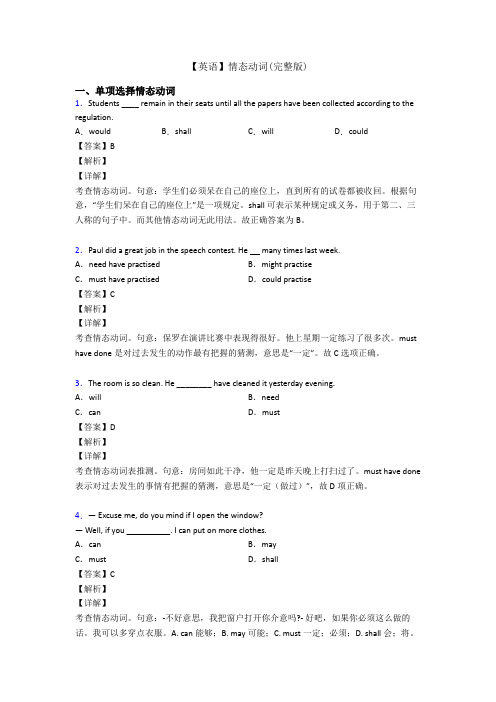
【英语】情态动词(完整版)一、单项选择情态动词1.Students ____ remain in their seats until all the papers have been collected according to the regulation.A.would B.shall C.will D.could【答案】B【解析】【详解】考查情态动词。
句意:学生们必须呆在自己的座位上,直到所有的试卷都被收回。
根据句意,“学生们呆在自己的座位上”是一项规定。
shall 可表示某种规定或义务,用于第二、三人称的句子中。
而其他情态动词无此用法。
故正确答案为B。
2.Paul did a great job in the speech contest. He many times last week.A.need have practised B.might practiseC.must have practised D.could practise【答案】C【解析】【详解】考查情态动词。
句意:保罗在演讲比赛中表现得很好。
他上星期一定练习了很多次。
must have done是对过去发生的动作最有把握的猜测,意思是“一定”。
故C选项正确。
3.The room is so clean. He ________ have cleaned it yesterday evening.A.will B.needC.can D.must【答案】D【解析】【详解】考查情态动词表推测。
句意:房间如此干净,他一定是昨天晚上打扫过了。
must have done 表示对过去发生的事情有把握的猜测,意思是“一定(做过)”,故D项正确。
4.— Excuse me, do you mind if I open the window?— Well, if you __________. I can put on more clothes.A.can B.mayC.must D.shall【答案】C【解析】【详解】考查情态动词。
情态动词完整版

二、情态动词的语法特征
1) 情态动词除ought 和have 外,后面 只能接动词原形。 2) 情态动词没有人称,数的变化,即 情态动词第三人称单数不加-s。 3) 情态动词没有非谓语形式,即没有 不定式,分词等形式。
三、情态动词的用法
A. can & could a. 表示能力 I can use the computer now, but I couldn’t a year ago. b. 表示请求和允许 Can you pr bike? Yes, you can. No, I’m afraid not. No, you can’t.
12. — It’s the office! So you _______ know eating is not allowed here. — Oh, sorry. (2009 湖南卷) A. must B. will C. may D. need 13. The traffic is heavy this day. I _______ arrive a bit late, so could you save me a place? (2009 辽宁卷) A. can B. must C. need D. might
8. “You ____ have a wrong number,” she said. “There's no one of that name here.” (2010 浙江卷) A. need B. can C. must D. would 9. — May I take this book out of the reading room? — No, you _____. You read it here. (2010 陕西卷) A. mightn’t B. won’t C. needn’t D. mustn’t
(完整版)情态动词总结

(完整版)情态动词总结情态动词专题情态动词表示说话人的语气和态度。
如需要、愿意和怀疑等。
它们有一定的词义,但不完整,必须和主要动词的原形一起构成谓语,常用的情态动词有:can, could, may, might, must, have to, ought to, should, will, would, need, dare, shall, , be able to及半情态动词had better, would rather, have to, would like to.情态动词的基本用法:一、can1. 表示能力“能……,会……”A computer can’t think for itself; it must be told what to do.2. 表示许可,“能够……,可以……”;在疑问句中表示请求许可“能不能……,要不要……,用could表委婉语气,还可以用may。
You can go out to play when you finish your homework.--Can /Could /May I go now ?—Yes, you can/may.Could you give me a lift to the station?3. 表示猜测,通常用在疑问句中,表示惊讶、怀疑;用于否定句中,表示有把握的否定推测“不可能……”Who can it be ?那会是谁呢?Can it be true? 那会是真的吗?She can’t be waiting for you. 她不可能在等你。
He can’t have g one there alone.他不可能独自一人到那儿去。
4.(表示平时大部分时间不是这样,只是偶然发生)“有时候会……”。
Some equipment at home can be dangerous to children.Peter can be really hard to get along with even though he is a nice person in general.特别记忆:①can not/ can never…too…或cannot … enough“再……也过分,越……就越好”You can never be too careful (you can’t be careful enough )while crossing the street.②can’t help doing sth.= can’t help but do sth = can’t but do sth =can do nothing but do sth.When a close friend dies, you can’t but feel sad.③were /was able t o do sth. 表示过去设法成功地做了某事,could没有此意The fire spread through the hotel very quickly, but everyone was able to get out.④can’t/couldn’t have done 不可能做过…;could have done 本来能够做,(却没做成)I could have worked out the problem,but I was too nervous.--- A man answered the phone. I suppose it was her husband.--- It couldn’t have been her husband. He had been dead for ages.二、may1.(表示许可、请求允许)可以……,might比may 的语气更委婉。
【英语】情态动词(完整版)
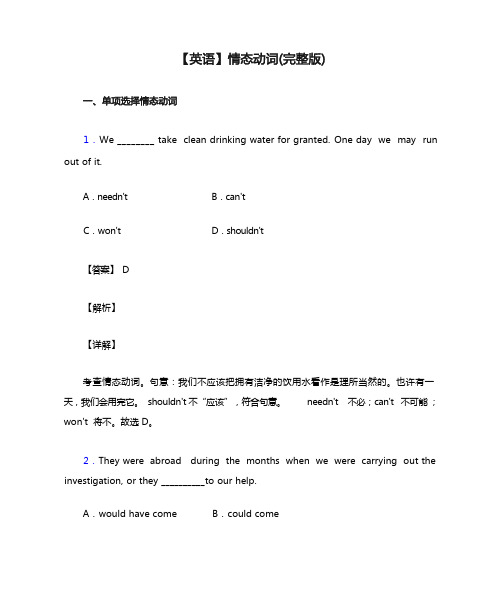
1.We ________ take clean drinking water for granted. One day we may run out of it.A.needn't C.won't B.can't D.shouldn't【答案】 D【解析】【详解】考查情态动词。
句意:我们不应该把拥有洁净的饮用水看作是理所当然的。
也许有一天,我们会用完它。
shouldn't 不“应该”,符合句意。
needn't 不必;can't 不可能;won't 将不。
故选 D。
2.They were abroad during the months when we were carrying out the investigation, or they __________to our help.A.would have come B.could comeC.have come D.had come【答案】 A【解析】试题分析:本句考查的是一个含蓄的虚拟条件句,句中的 or 相当于 if they hadnot gone abroad. 因为前面句中使用的是 were ,说明这个虚拟语气是与过去事实相反,所以主句中使用的是情“态动词+have done”的形式。
句意:当我们在做调查的那几个月里,他们一直在国外,否则的话他们早就来帮助我们了。
故 A 正确。
3.—I have something important to tell John. But I can’t find him.— His cell phone is here, so he ________ have gone too far.A .mustn’tB .needn’tC .wouldn’tD .can’t【答案】 D【解析】【详解】考查情态动词。
句意:——我有重要的事情要告诉 John ,但是我找不到他。
初中情态动词最全讲解,从此不再害怕情态动词(值得收藏)

初中情态动词最全讲解,从此不再害怕情态动词(值得收藏)一.情态动词的用法(必须掌握)1. can 用法1)表示能力,与be able to同义,但can只用于现在时和过去时,be able to可用于各种时态。
Two eyes can see more than one.注:Can you … ? Yes, I can / No,I can’t.2).表示允许、请求用could比can 语气更加委婉客气,常用于could I /you …..?句型中,若表示同意时,用can回答而不用could .Could I borrow the book ? No, you can’t .3)。
表示推测“可能”常用于否定句或疑问句中。
(can’t表示一定不是)It can’t be true .Can it be true ?2. may 用法1)表允许,请求= can表示许可或征求对方的许可,常于第一人称连用。
注:May I ….? Yes ,you may No, you can’t / mustn’t .在回答以may引起的问句时,多避免用这个词,而用其它方式,如Yes, please. / Certainly.2)表推测,可能、也许。
常用于肯定句中。
Maybe he knows the news .=He _____ _____ the news.3. must1)表示义务。
意为“必须”(主观意志)。
We must do everything step by step.注:Must I ….? Yes, you must / No,you needn’t(don’t have to ).--Must we hand in our exercise—books now?--No, you needn’t. / No, you don’t have to.2)mustn’t 表禁止、不允许。
You mustn’t talk to her like that.3)表示揣测。
英语情态动词(完整版)含解析

英语情态动词(完整版)含解析一、选择题1.— Could you please clean your room?—_________. I’ll do it at once.A.Yes, sure B.Sorry, I can’t C.It doesn’t matter D.Here you are 2.—Jim seems to be in low spirits. ________?—No one liked his plan. All his efforts were useless.A.Guess what B.What about him C.So what D.What happened 3.—Here’s your change.—________A.My pleasure. B.Thank you. C.With pleasure. D.No problem. 4.—I plan to find a part-time job in the coming summer holiday.—________ It will be a totally different experience.A.See you later. B.You’d better not.C.I’m sorry to know that.D.That sounds like fun.5.—Oh, no! There isn't any salt left.—____________! I’ll buy some when I go into town.A.Good idea B.Go ahead C.Never mind D.Not at all6.—I thought I’d try to repair the car myself.— __________ ! You know nothing about the car.A.No way B.You can’t be serious C.I couldn’t agree more D.Don’t change a thing7.— I am so sorry to keep you waiting for such a long time.— ________.A.Please shut up B.It’s your m istake C.It doesn’t matter D.Don’t explain it 8.—It's a shame to ask you to lend me more money, but. . .— ______ . You really need money to keep on with your education.A.Don't be silly B.Forget it C.No way D.Don't mention it 9.—Amazingly, I've managed to finish the project by myself.—___________I told you it was easyA.With pleasure. B.Guess what? C.There you are! D.It doesn’t matter 10.--Would you like to go shopping with me on Saturday?-- . I have to help my mother with housework.A.I’m afra id not B.Take your timeC.Enjoy yourself D.That’s all right11.–This box is too heavy for me to carry upstairs.–__________A.You may ask for help B.I’ll give you a handC.Please do me a favor D.I’d come to help12.—I just got a message from Ms. Yang and she said she would come to our meeting this afternoon.— She always has good ideas.A.Why not? B.What a pity! C.Time is up. D.That’ll be very nice. 13.-Do you think the rain will stop tomorrow?-_____. It has rained for four days. It’s too wet everywhere.A.I hope not B.I don’t think soC.Don’t worry D.I hope so14.—I’m so sorry to keep you waiting for me so long.— ________!A.With pleasure. B.Don’t say so C.I don’t think so D.It doesn’t matter 15.—Would you please help me with my spoken English?—__________. First you should know practice makes perfect.A.That’s right B.No problem C.Quite well D.No, thanks 16.—Lucy, can you help me with my history?—________. I am good at it.A.With pleasure B.I’m afraid not C.Sorry, I can’t D.No way 17.—Sir, this is your order, two chicken hamburgers and a cup of coffee. ________—I’ll have them here.A.For here or to go? B.Something to drink? C.Anything else? D.Is that OK? 18.—I missed the basketball game last Saturday because I had an exam.—________, but it will be repeated on TV.A.Take it easy B.You are lucky C.That’s wonderful D.Never mind 19.—Why not take your son to watch the new film A Little Red Flower?—__________.A.Good idea B.No problem C.Good luck D.No way 20.—Do you like cartoons or scary movies?—_______. They can cheer me up.A.Yes, I do B.No, I don't C.Cartoons D.Scary movies 21.—I’m sorry I didn’t make it to your birthday party last night.— ________ I know you are busy recently.A.Why not? B.Don’t mention it.C.No way. D.That’s all ri ght. 22.—Excuse me, can you give me some water? The cup is empty.—________A.Go ahead. B.My pleasure C.At your service D.You’d better not. 23.—You seem so happy today, Jack.—________? I won the first prize in the singing competition yesterday.A.So what B.How come C.Guess what D.Why not 24.—I’m going hiking this afternoon. Would you like to go with me?—______, but I must finish my homework first.A.Sorry, I don’t B.That’s right C.I’d love to D.Not at all25.—I prefer western food. It’s delicious and goo d for us.—_______ ? But western food is said to be high in sugar and fat.A.Is that right B.How do you know thatC.Do you really think so D.Who told you that26.—Many people think women are better at cooking than men.—________. Most top chefs in the world are men.A.I agree B.I can’t agree more C.Not at all D.That’s not the case 27.—All of Mark Twain’s novels are popular.— ________. Especially The Adventures of Tom Sawyer.A.I can’t agree more B.That’s not the case C.That’s not the point D.Don’t mention it 28.—Could you help me look after my baby ________ I am away?—________.A.as; With pleasure B.while; My pleasure C.as; That’s all right D.while; With pleasure29.—Would you mind if I open the window?—_______.We need fresh air.A.Not at all B.Yes, of course C.You’d better not D.That’s all right 30.—Only those who have a lot in common can get along well.—________ Opposites sometimes attract.A.I think so. B.I don’t think so.C.I don’t care.D.I hope so. 31.—Only those who have a lot in common can get along well.—________. Opposites sometimes attract.A.I think so B.I don’t think so C.I don’t care D.I hope so 32.— Why will you take part in the charity walk? You are not good at running at all.— ________. I run to show that I can help others.A.Not exactly B.That’s not the point C.I can’t agree more D.It sounds like a pity 33.—Shall we go to the amusement park right away or the day after tomorrow?—________. Any time will do.A.Excuse me B.Have a good timeC.It’s up to you D.I’m afraid I can’t34.—How do you like coffee, Minnie?—It tastes very terrible. ________.A.I have no idea B.I don’t mind it C.I really can’t stand it D.I can’t afford it 35.— May I have a look at the newspaper China Daily?— Certainly. ________A.Thank you. B.It’s a pity.C.Here you are. D.I’d like to. 36.—________!—Yes. It sounds gentle and relaxing.A.How good the vegetable soup is B.How exciting the storybook isC.What nice music Ann is playing D.What a beautiful flower Jim keeps 37.—The game is too hard for me. I will certainly lose.—________. You should never say no before you try.A.Forget it! B.Come on! C.I’m sorry.D.Pardon me? 38.—I wonder if Tenny is doing well in her new school.—________. She is old enough to look after herself well.A.You’re welcome B.Good luck C.It’s a pity D.No need to worry 39.—Why don’t you join in a club to practise speaking English?—________.A.That’s a good idea B.Never mind C.Yes, please D.Thank you 40.—I’ll be away on a business trip. Would you mind looking after my cat?—Not at all. ________.A.It’s my pleasure B.I’d rather not.C.I’d like it.D.With pleasure. 41.— Wow, what a good smell! Can I have a piece of cake?— ________A.No way. B.Good idea! C.HeIp yourself. D.What a pity! 42.—Summer camping gives children the chance to live away from home.—________. It is always good to help children grow up.A.That’s true.B.Come this way. C.Let me have a look. D.I don’t think we agree.43.— Would you mind my turning on the TV? The New Year concert has just begun.— ________. Just go ahead.A.Ple ase don’t B.Better not C.Of course not D.I’m afraid not 44.—I visited the Purple Mountain Observatory by myself last Saturday.—________ Why didn’t you tell me earlier?A.You did? B.I hope not. C.Have a good time. D.I can’t believe it. 45.—Mum, Joe has broken a cup!—________. Accidents always happen.A.Pretty good B.Of course C.It doesn’t matter D.That depends 46.— The movie Lost in Russia sends a message about the importance of family.— ________. It reminds me of my parents.A.I hope so B.That’s all righ t C.You bet D.I don’t think so 47.— Are you feeling any better now after taking the medicine?—________. I’m feeling even worse.A.You got it B.Never mind C.Sorry to hear that D.Quite the opposite 48.—Another Friday! Let’s go to see the play tonight.—________ I will book the tickets online.A.My pleasure. B.That’s right.C.Why not? D.Never mind. 49.—Can I look at the menu for a few more minutes before I decide?—Of course. ________, Sir.A.Make yourself at home B.Enjoy yourself C.It doesn’t matterD.Take your time50.—How about putting some pictures into the report?—________ A picture is worth a thousand words.A.I don’t think so.B.Why not?C.Thank you. D.Don’t mention it.【参考答案】***试卷处理标记,请不要删除一、选择题1.A【解析】本题考查的是情景反应,要用客气婉转的回答方式。
常用的情态动词

1.情态动词本身有词义, 但词义不完全.2.不能单独作谓语,只能和动词原形一起构成谓语.3. 情态动词没有人称和数的变化( 除“have to”).1. can /could1)can ,could 用在肯定句中表示理论上的可能性,“经验之谈”As a human being, anyone can make a mistake.2)表示推测时,主要用在否定句或疑问句中。
can’t be\couldn’t be “肯定不是……, 不可能…”It’s so late. Can Tom be reading?It can’t be Mary. She has fallen ill.can/could not be doing “肯定不是正在做……”can/could not have done “过去不可能做某事”3)can/could have done 用于肯定句中“本来能做”You could have had a better mark.4)---Could (Can) you…?--- Yes, I can (不用could)--- May I use your computer?--- Of course you can.5) cannot (help\choose)but +动词原形“不得不,只能”I cannot help but tell her the truth.cannot help it “控制不住,没有办法”cannot …too……“无论怎样也不为过”I cannot thank you too muchcannot help doing sth 禁不住做某事6)couldn‘t +动词原形+比较级(再…不过了)It couldn't be better.I couldn't agree with you more.2may与might用法1.) 表示推测时,用于陈述句,表示把握不大。
(完整版)情态动词知识点总结

(完整版)情态动词知识点总结什么是情态动词情态动词(Modal verb)是一种特殊的动词形式,用来表示说话人对某种行为、情况或可能性的态度、观点、意愿、能力等。
情态动词可以用来构成陈述句、疑问句、否定句、建议句等。
常用的情态动词及其用法1. Can:表示能力、许可、可能性、请求等。
Can:表示能力、许可、可能性、请求等。
- 表示能力:I can swim.(我会游泳。
)- 表示许可:Can I use your phone?(我可以用一下你的手机吗?)- 表示可能性:He can be late.(他可能会迟到。
)- 表示请求:Can you help me?(你能帮我吗?)2. Could:表示过去的能力、请求、建议等。
Could:表示过去的能力、请求、建议等。
- 表示过去的能力:When I was young, I could run faster.(我年轻的时候,跑得更快。
)- 表示请求:Could you please pass me the salt?(你能给我递一下盐吗?)- 表示建议:You could try using a different approach.(你可以尝试用一种不同的方法。
)3. May:表示可能性、许可、祝愿等。
May:表示可能性、许可、祝愿等。
- 表示可能性:It may rain tomorrow.(明天可能会下雨。
)- 表示许可:May I use your bathroom?(我可以使用你的卫生间吗?)- 表示祝愿:May you have a happy birthday!(祝你生日快乐!)4. Might:表示可能性、建议、推测等。
Might:表示可能性、建议、推测等。
- 表示可能性:She might be at home.(她可能在家。
)- 表示建议:You might want to consider another option.(你可以考虑另一个选项。
情态动词复习(整理版,最全)
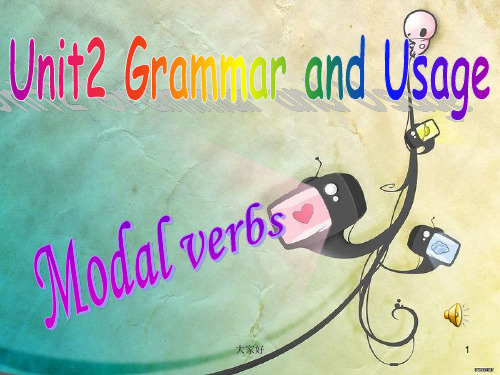
A. must C. should
B. need D. can
答案:C
大家好
情态动词表示“许可”、“允许”的用法 can/could/may/might 过去式could常用于疑问句中,比can更加委
婉,表示礼貌。回答时,常用原形can或者 may,不可再用过去式could/might。 e.g. — Can/May/Could I use your pen? 肯定简略回答:— Yes, you can/may.
大家好
15
Note:
表示特定的某一过去能力或表示成功地做 了某事时,只能用was/were able to, 不 能用could。
He w__a_s_a_b_l_e_t_o flee Europe before the war broke out.
大家好
16
• A big fire broke out in ABC hotel yesterday.
The old man _w_o_u_ld___have a smoke under a big tree every afternoon after he finished his farm work.
大家好
26
• will 表示意志,愿望,决心。
I will give up smoking.
---Write to me when you get home.
大家好
6
情态动词表示能力
情态动词表示能力时,一般用can/could或 be able to。
1.can常指现在,较常用;如果只表示能力时 ,两者都可用。
e.g. I can / am able to swim. 2.be able to ① 可用于各种时态 e.g. We shall be able to finish the
常见的情态动词有简版范文
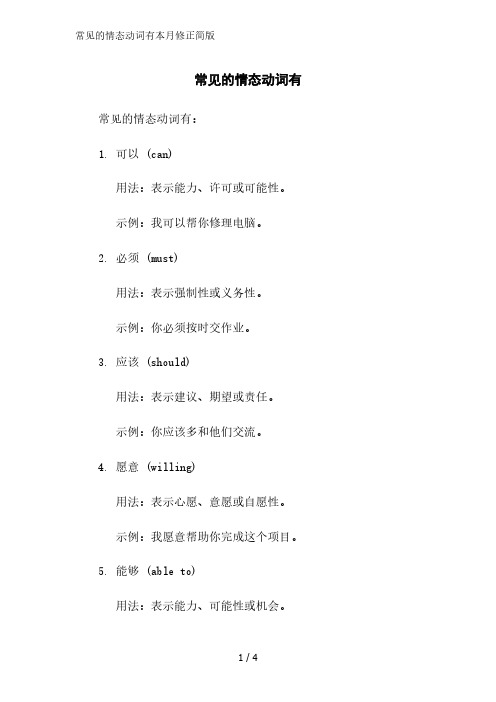
常见的情态动词有常见的情态动词有:1. 可以 (can)用法:表示能力、许可或可能性。
示例:我可以帮你修理电脑。
2. 必须 (must)用法:表示强制性或义务性。
示例:你必须按时交作业。
3. 应该 (should)用法:表示建议、期望或责任。
示例:你应该多和他们交流。
4. 愿意 (willing)用法:表示心愿、意愿或自愿性。
示例:我愿意帮助你完成这个项目。
5. 能够 (able to)用法:表示能力、可能性或机会。
示例:我能够独立完成这项任务。
6. 在过去,可以 (could)用法:表示过去的能力、许可或可能性。
示例:他过去可以说流利的法语。
7. 在过去,必须 (had to)用法:表示过去的强制性或义务性。
示例:我昨天晚上不得不加班。
8. 在过去,应该 (should have)用法:表示过去的建议、期望或责任。
示例:你昨天晚上应该去参加聚会。
9. 在过去,愿意 (was willing)用法:表示过去的心愿、意愿或自愿性。
示例:我昨天晚上愿意帮助你的。
10. 在过去,能够 (was able to)用法:表示过去的能力、可能性或机会。
示例:我昨天晚上能够准时到达会议室。
11. 可能 (may)用法:表示可能性、许可或请求。
示例:我可能会迟到一些,请等一下。
12. 可能 (might)用法:表示过去的可能性、许可或请求。
示例:我可能会迟到一些,请等一下。
13. 不可以 (cannot)用法:表示禁止、不可能或不许可。
示例:你不能在这里抽烟。
14. 不必须 (not have to)用法:表示不必要或没有义务。
示例:你不必非要等到明天。
15. 不应该 (should not)用法:表示不应该或不建议。
示例:你不应该对他说那样的话。
16. 不愿意 (unwilling)用法:表示不愿意或不希望。
示例:他不愿意参加这个聚会。
17. 不能够 (unable to)用法:表示无法、不可能或没有机会。
示例:他无法赴约因为其他事务。
(完整版)常见情态动词讲解

常有神态动词解说一、情的定:情有,但它不可以独作,它必和其余一同组成。
情没有人称和数的化;它的后边必跟原形。
二、情的种:情否认形式can能,会can’t不可以,不会could能,会couldn ’t不可以,不会may能够//must必mustn’ t不允,不可以shall将,要shan’t将不要should shouldn ’t不need需要needn’t不用would将会,愿wouldn ’t不会,不肯三、情的用法及主要句型:1、 Can I help you?——Yes, please. / No, thanks.2、 Can + 主 + 原形 ? Yes, ~ can. No, ~ can’ t.3、 Can I borrow your book?----Yes,of course.4、 Can I write on the book? ------No, you can mustn’t’ t.5、 Could \Can you help me?---- Yes,of course.\Certainly.\ Sure.6、 Could \Can you tell me the way to the Zoo?7、 May I come in ?----- Come in, please.8、Sorry, please don’ t.9、 May I have some Coke?---- Yes, of course.10、May/ Could / Can I speak to Tom? -----Speaking. Who ’ s calling?11、should 、 shouldn ’表t示告:1)He should get up early.2)She shouldn ’ t play computer game too much.12、Should +主 +原形 ? Yes, ~ should.\ No, ~ shouldn ’ t.13、表示建“你愿意⋯ ”---Yes, I’ d love to. /I’ d love to. But I’ m busy now.14、就餐用 Would you like something to eat\drink? ----Yes, I’ d like⋯15、shall 用于第一人称 (I, we), 能够表示“将”和表示建“⋯⋯好?”1)Where shall we have dinner?2)Shall we go fishing? -----All right. \OK. \Good idea.16、Must + 主 + 原形 ? ---Yes,~ must.\No, ~ needn’ t.四.常情的区:1. can (could)1)表示能力, could 主要指去。
(完整版)情态动词must、can、could、may、might精解

would : 1. 表 will 的过去 ,用于过去未来时2.表 "意向 ",愿意做某事3.虚构语气could: 1. 表 can 的过去 ,表过去的能力2表恳求 (委宛语气 )3.表猜想 :可能是 ...4.虚构语气should: 1. 表 shall 的过去 ,用于过去未来时,搭配第一人称2.表委宛的语气 : 应当做 ...3.虚构语气might: 1. may 的过去 ,表猜想 :可能是2.表允许 (委宛语气 )may:1. 表猜想 : 可能是think of shall 和2. 表允许想起 , 想到 ; 没有 think fromwill 的用法的用法一.1、 shall 用在第一、三人称,will用于第二人称表示“征采建议”。
Shall I go now?Shall we invite her, too?Will you help me with the work?Shall the reporters wait outside or what?2、 shall 表示依照规定有义务去做。
Passengers shall not talk with the driver while the bus is moving.3、 shall 用于全部人称,表示说话人的承诺、威迫、警示、命令等。
You shall have an answer by tomorrow.If he’ s good, he shall have a new watch for Christma.If you children don’ t do as I tell you, you shan ’ t go to the party. 4、 would 能够表示过去的习惯(would 可表示频频发生的动作或某种偏向。
used to 表示过去的习惯动作或状态,重申此刻已不存在)He would come to see me on Sunday when he was here.The dog would lie there in the sun all afternoon.When we were children, we would go skating every winter.5、 will 能够表示“愿意” ,而非未来 :I will pay you for it.我会付给你钱买下它的。
- 1、下载文档前请自行甄别文档内容的完整性,平台不提供额外的编辑、内容补充、找答案等附加服务。
- 2、"仅部分预览"的文档,不可在线预览部分如存在完整性等问题,可反馈申请退款(可完整预览的文档不适用该条件!)。
- 3、如文档侵犯您的权益,请联系客服反馈,我们会尽快为您处理(人工客服工作时间:9:00-18:30)。
情态动词1. 情态动词的推测表达2. 情态动词表达虚拟语气3. 某些情态动词的特殊用法一、知识重点与难点总结知识重点:情态动词在表达推测意义的句子中的运用:(一)用情态动词表达事实的推测。
can,could,might,may,must可以用来表达对事实的推测。
根据说话人对事实的把握性大小,must表示“肯定…”,may / might / can / could表示“可能……”,must 只用于肯定句中,may / might的否定式may not / might not表示“可能不……”, 而can / could可以用于疑问句,表示“可能,可能……吗?”,其否定式can’t / couldn’t表示“不可能”。
用情态动词可以对现在或过去的事实进行推测。
对不同的时间内容推测有不同的结构。
(二)对现在的事实进行推测:主要结构:…must / may / might +动词原形be+名词/形容词/介词短语be + doing例句:1. You must be Jeanne. I’m Mathilde Loisel. We used to know each other very well.2. They must be in bed already at this time of the night.3. The teacher must be joking.4. Freda isn’t in class. She m ust be sick.5. There must be something wrong.6. She might be very clever, but she hasn’t got much common sense.7. He may be arriving this evening.8. He may be traveling around the world.9. The keys can’t be in the room. I have just searched it ve ry carefully.10. Can the news be true?(三)对过去的事实进行推测:结构:情态动词+have done / been+名词/形容词/介词短语例句:1. Mrs. Longmans must have been a pretty girl in her youth.2. He couldn’t have seen Anna yesterday. She’s gone abroad.3. I think I must have left my glasses in the library.4. He might have overslept again.5. Where can Tom have gone ?情态动词表达虚拟语气:表达“本来…”,“不然早就…”。
这是情态动词的一种虚拟语气用法。
表示说话人所讲的与所发生的事实相反。
表达了说话人的埋怨,后悔的语气。
其结构是在一些情态动词后面加have done 结构。
根据要表达的意思,有如下结构:should have done / ought to have done:本应该……shouldn’t have done / oughtn’t to have done:本不该……could have done:本来可以……needn’t have done:本来没必要……would like to have done:本来很想……would rather not have done: 本来不愿意……could / might / have done: 不然早就……例句:1. You shoul dn’t have laughed at his mistakes.2. You could have told us earlier.3. I ought to have bought that dictionary last week.4. You ought not to have spent so much time in reading novels.5. We need not have been in a tearing hurry to catch the train.6. They would like to have seen that film last film.7. If he had given me his number, I could have telephoned him.8. They might have been frozen to death but for the rescue in time.知识难点:某些情态动词的特殊用法:need 和dare 的两种形式的用法need 和dare可以用做实义动词,后面接不定式(to do)结构,在疑问句和否定句中,加助动词do/does/did/或don’t/doesn’t/didn’t。
作为情态动词使用时,主要用于疑问句和否定句中。
情态动词needn’t(没有必要,不必)相当于don’t have to例句:1. It is cold, you need to wear some warm clothes.2. Need I stay here with you for a while? Thank you, you needn’t.3. How dare you speak to parents like that?注意:句型I dare say+从句。
意思是:我肯定…… = I’m sure或There is no doubt that+从句。
例句:I dare say that my uncle will get the money if I die.will和would表示“意志”或“愿意”,would 则指过去愿意做……例句:1. He said that he would help us.2. You may telephone if you will accept this job.would可以表达“过去习惯做……”类似于“used to do”例句:1. When we were children, we would go swimming every summer in that river.表示请求,固定的句型:Will/Would you please do…? / Would you like to do…?例句:Will/Would you please give him a message when you see him ?shall1. 用于第一,三人称,表示“请求”;“建议”或“推荐”例句:1. Shall we start the meeting now?2. Shall I watch TV now?3. Shall my son carry the case for you?2. 用于第二人称,表示“命令,“要求”,“许诺”例句:1. You shall take whatever you like.2. You shall not go to the party with me if you make so much noise again.在表示推测的否定句或疑问句中,常用can /can’t /could / couldn’t表示,意思是:“可能…吗?”;“…不可能…”。
而不能使用mustn’t或must等词。
【典型例题】1. —Do you think he will do me a favor ?—As far as I know, he is the last one to help others. He _____ be prepared to give you a hand, though.A. mightB. mustC. canD. should分析:本题考查情态动词推测性用法。
根据he is the last one to help others.(他是最不可能帮助别人的人),既然如此,那么“帮助你”的可能性也就最小了。
答案为A2. —Look, someone is coming. Guess who it ____ be ?—I think it ___ be Tom.—I don’t think it ___ be ____ .A. can ; must ; can ; heB. may ; can ; must ; himC. must ; can ; must ; hisD. might ; must ; can ; himself分析:根据备选答案。
can表示推测时用于疑问句或否定句中。
本题首句就应该是Guess who can it be? 第二句应该是I think it must be Tom.(说话人十分肯定)。
第三句表达了说话人对前一个人的否定。
即:I don’t think it can be him/he.(不可能是他)。
答案为A3. —Do you know Ms. Wang likes walking after supper ?—Sure. She ____ around the campus now.A. must be walkingB. must walkC. may walkD. may be walking分析:关键词Sure告诉我们说话人的口气十分肯定。
根据句子语境:她此刻肯定正在校园散步呢。
must be doing表示肯定正在做。
答案为A4. —I stayed at a hotel in New York.—Oh, did you ? You _____ with Barbara.A. could have stayedB. could stayC. would sayD. must have stayed分析:首句说:我在纽约住在一家宾馆里。
在此a hotel是泛指。
所以D选项不合题意。
第二句在说:你本来可以和Barbara.住在一起的。
Could have done表示:本来可以。
答案为A5. Why didn’t you tell me there was no meeting today ? I _____ all the way here through the heavy snow.A. needn’t have drivenB. can’t have drivenC. mustn’t have drivenD. shouldn’t have driven分析:根据句意:你为什么不告诉我今天没有会?我本来没必要冒着大雪开车跑这么多路。
